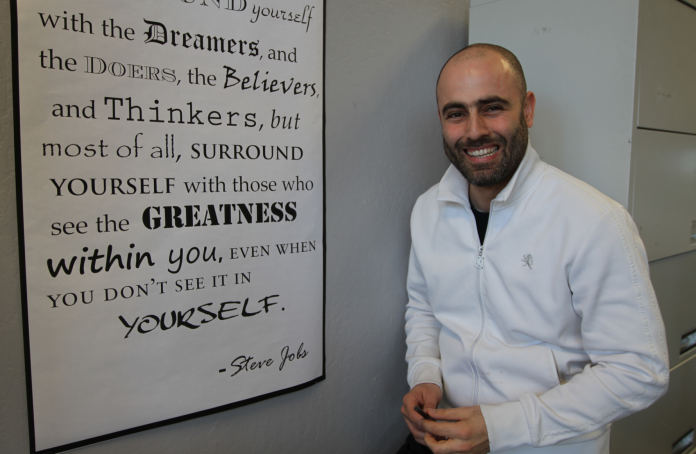Gilroy’s Waseem Rabih hopes Americans will take a good, fair look at the controversy surrounding Syrian refugees seeking asylum in the United States.
He fears that politicians and the media have blown things out of proportion, demonized them and made them out to be threats to the country, when, in his opinion, they are victims of war who need help and who become patriotic Americans when they come here.
He should know. He was one.
Rabih, 34, who owns The Print Shop in Morgan Hill, arrived in the U.S. when he was 14 and barely spoke English. Today, his shop prints flyers and documents for businesses all over the area, including police departments, government agencies and the YMCA.
He is Christian and his father-in-law was murdered in Syria because of his religion. He’s not only found refuge in the South Valley, but he’s prospered, raising 5-year-old twin girls, owning a home and joining the Gilroy Rotary Club. Every year, Rabih returns to the Middle East to help other refugees—most of them not of his religion—because he believes that he has to share the benefits he’s received.
“The refugees running out of Syria, looking for safety, looking to get their family out of war, have nothing to do with any of the terrorist attacks that we are seeing these days,” he said. “Terrorist attacks are happening by thugs, by extremist radicals who are most likely on drugs, some kind of drug, who are looking for money and power. They are funded and they have a lot of money and a lot of weapons. It’s like the Mafia.
“And they are not poor. These people have a lot of money. If they didn’t have the money, they wouldn’t have the explosives, which cost a lot to get. Refugees are extremely poor. They’ve lost their homes. They’ve lost their land, family members, and they are just running away to have some kind of food and some kind of refuge.”
Rabih went to high school in Pennsylvania, where some of his family lived. He gained U.S. citizenship in 2002, in the first group of Arabic immigrants to do so after 9/11. He was the youngest person sworn in then, and he was covered by local media.
He not only mastered English, but got into Penn State University, where he majored in international business. That led to a job at Wells Fargo in California, which then turned into careers in real estate and car sales, all of which were lucrative, but didn’t give him the time he needed to raise a family with his wife.
Two years ago he bought the print shop with the money he saved and took a huge step toward fulfilling his American Dream. It wasn’t without a pitfall, when a competitor told people he was a terrorist because he was from Syria. But his clients, seeing the quality of his work, stayed with him and kept him busy.
“I was about to go bankrupt, but I went out there and kept talking to people, hustling, talking to new accounts. I made the company survive.”
His clients include the city of Morgan Hill, Fry’s Electronics, the Morgan Hill Fire Department, Ramos Furniture and the Morgan Hill Police Department.
Rabih fears people may be prejudiced against him because of his nationality, but in the wake of the Syrian refugee crisis, he wants to share his story. He told it at the Gilroy Rotary Club and more than a few people shed tears. He hopes sharing his story will encourage others to take a good look at the new refugees.
“I’ve seen refugees,” he said. “I’ve talked to them. They are not the same religion as mine, but they are humans just like me. I know so many. They are all hard-working. They don’t want to depend on the system. They don’t want to live at the expense of the government. They want to work. They want an opportunity to work and educate their kids and just live a peaceful life.”
He hopes Americans will take a more humanitarian stance toward refugees fleeing Middle Eastern governments that don’t respect human rights. He hopes Americans will choose human rights over oil money and not side with inhumane governments just because they have oil.
What about the terrorism in San Bernardino and violent incidents by refugees reported in Germany?
“Go anywhere and select a thousand people, whether you are in America or somewhere else. Do you think those thousand people are going to be good clean-cut people without any troublemakers? In every neighborhood there’s somebody who has some kind of problem. A drug problem, a drinking problem, gambling problem, anger problem. Something.
“If we allow a million refugees from Syria, we’re allowing people who have nothing to come to this country. They have nothing. No arms, no money, nothing.
Rabih just wants others to have the opportunity he and his family have been given. That’s one of the reasons he joined Rotary, because the organization travels the world selflessly helping people.
“Am I a proud American? Absolutely. Because this country does provide an opportunity for people that want to work hard and make something happen, that want to help other families grow.
“I’m proud because I belong to a society that believes it’s not always about us or about me. It’s about giving back. I came here with a lot less things than I have now. I look around me and I see people who need help, whether it’s here or overseas, and especially children, and that’s something that moves me. To see a child who is suffering from a war or an illness, my gut feeling always tells me I should do something.”













